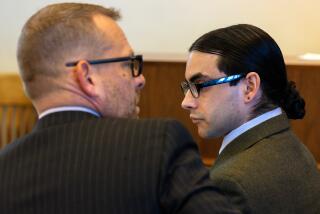Killer of 6 women is sentenced to death
- Share via
Before he was sentenced to death Wednesday, Ivan J. Hill’s lawyers made their final arguments to spare his life.
Then the families of the six women he raped and strangled got their first chance to tell him where they thought he belonged. Essentially, they agreed with Mary Brooks, the mother of one of the victims, who spoke first.
“You should go to hell,” Brooks said, as others in the courtroom murmured in agreement. Brooks looked straight at Hill, who sat silently in an orange jail suit. She recalled him picking up her daughter, Roxanne Bates, at their house the night she was killed.
Brooks said Hill returned to their house the next day to ask where Roxanne was. “I remember your face. Do you remember?” she asked.
Hill looked her in the eye as she spoke, as he did to all who addressed him, but said nothing.
Over three months in the winter of 1993, Hill had dumped his victims’ bodies throughout the San Gabriel Valley. One lay in a Dumpster, a Grape Crush soda can above her head, her bracelets still on her wrists. Hill had not robbed her; $100 in folded bills remained beneath her body. Another woman was dropped on the dirt in a park, in front of a bush of bright yellow wildflowers. Others were strewn on roadsides and in parking lots.
The crimes were unsolved for 10 years, until DNA tests identified Hill as the killer in 2003. His semen was found in the women, and his scraped skin was under the fingernails of those who fought him to their deaths.
Before Los Angeles County Superior Court Judge Larry Paul Fidler upheld the January jury order of death for Hill, a procession of victims’ loved ones tearfully and angrily confronted Hill.
Sisters, daughters, a mother, a husband and a brother of women murdered by Hill repeatedly told him that he must die.
Many invoked faith and forgiveness but said they could forgive Hill after he was executed.
Angel Lathan, the older sister of victim Donna Goldsmith, spoke of her Buddhist faith and said Hill had a chance to make amends in another life.
“The death penalty is an act of unconditional love to your retribution,” she said, holding a portrait of her sister as she spoke, showing it to Hill.
Lathan said she did not recognize her sister when she saw her body in the funeral home. After first thinking that there might have been a mistake, she said, “I thought, ‘Oh, that’s what someone looks like when they say she was beaten beyond recognition.’ ”
Precious Goldsmith, Donna Goldsmith’s 18-year-old daughter, a preschooler when her mother was killed, left the courtroom in tears as her aunt spoke. She returned and angrily asked Hill, “What is your purpose on Earth?”
“You shaped my life,” she told Hill. “Now, I know if I can get through this I can get through anything, but that is not how I wanted my life to be shaped. I hate you.”
Hill’s lawyers had argued that his traumatic childhood should be considered a mitigating factor to spare him execution. When Hill was 7, he and his siblings saw his father shoot his mother in the face on Christmas. Hill’s mother, who survived, testified that Hill’s father abused him as an infant and potty-trained him by spanking him if he didn’t use the toilet.
Hill’s lawyers said he coped with abuse by presenting a happy public face but hid his emotional turmoil. Hill was a high school football star; a teacher testified that he was her favorite student.
Hill’s father, William Hill, sat silently through the sentencing, wearing a black suit and black tie.
Fidler said Wednesday that he believed Hill suffered from abuse but that his crimes called for a death sentence.
Jennifer Friedman, one of Hill’s lawyers, said she was saddened by the sentence. “Life without parole would have served its purpose. No more was required or warranted,” she said.
Friedman said that appeals in death penalty cases can last for many years.
Hill’s only words came when Fidler asked him if he had anything to say. Softly, politely, he replied, “No, your honor.”
More to Read
Sign up for Essential California
The most important California stories and recommendations in your inbox every morning.
You may occasionally receive promotional content from the Los Angeles Times.












